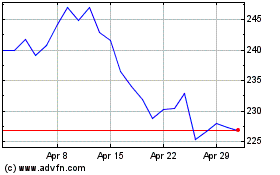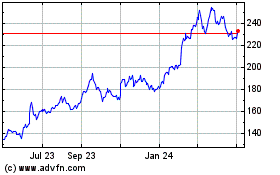GM to Acquire Cruise Automation
March 11 2016 - 1:10PM
Dow Jones News
General Motors Co. on Friday said it is buying Cruise Automation
Inc., a Silicon Valley startup that could help the auto maker speed
its development of autonomous technology and give it an edge over
companies looking to introduce driverless cars.
The venture-backed Cruise, founded in 2013, is one of a handful
of companies with a permit from the California Department of Motor
Vehicles to test autonomous vehicles on the road. The company is
testing near its home base in San Francisco and has raised about
$20 million in venture capital.
Bolstered by record U.S. auto sales and looking to broaden its
business beyond producing and selling conventional car and trucks,
GM has acquired or invested in a handful of new technologies. It
invested $500 million to partner with Lyft Inc., a ride-sharing
service, and purchased assets from Sidecar Technologies Inc. to
help an effort to create its own car-sharing service.
The auto giant's efforts follow a broader industry push to
prepare for shifts in consumer behavior. As cars become more
automated and younger people delay getting licenses or move to
urban centers, car companies expect car sharing, ride-hailing
services and autonomous cars to be in greater demand.
Separately, Ford Motor Co. on Friday said it would establish a
new unit focused on autonomous-car development and other mobility
solutions, such as car-sharing and on-demand rides.
Jim Hackett, a longtime chief executive at furniture maker
Steelcase Inc. and recent Ford board member, will head up the new
unit as chairman. The subsidiary, Ford Smart Mobility LLC, will
have operations in Silicon Valley and Ford's headquarters in
Dearborn, Mich., and will report profits and losses independently
from other business lines.
Terms of GM's purchase of Cruise weren't disclosed. GM gradually
has been introducing semiautonomous features on vehicles, such as
lane-keeping assist and adaptive cruise control. A new hands-free
driving system, dubbed Super Cruise, debuts on Cadillac models next
year.
Cruise has developed systems that take autonomous vehicles
further. It initially made a product called RP-1, a retrofit that
enabled late-model Audi vehicles to run on autopilot at highway
speeds capability. Cruise planned to sell a limited number of
systems for $10,000.
In an interview, GM President Dan Ammann said the Cruise
acquisition provides the talent needed to develop vehicles with
fully autonomous capability. He said further major acquisitions are
less likely now that GM owns Cruise.
GM is planning to make Cruise an independent unit within in its
autonomous vehicles development team and will recruit people to
expand the team.
"We think this capability is critical to where we want to be in
the future," Mr. Ammann said. "The Cruise team has demonstrated a
very deep capability in this area…which should significantly
accelerate our overall deployment of autonomous vehicles."
Cruise founder Kyle Vogt said he started the company in 2013
with a goal of using autonomous technology to make transportation
safer and more accessible. By tying up with the manufacturing
experience and resources of GM, his company's software should allow
Cruise to achieve its goal sooner, he said.
The Cruise unit will remain in San Francisco so it can continue
to develop its autonomous driving software as quickly as possible.
He said the entire Cruise team, about 40 people, will join GM, but
he wouldn't comment on whether he has made a commitment to stay
with GM for a specific time period.
"It's very clear to people in this space that a company like
Cruise with resources of company like GM presents a very compelling
opportunity and clear statement that we intend to move quickly and
want to win this space," Mr. Vogt said.
While autonomous vehicles have long been under development,
plenty of kinks remain. The Obama administration is considering
allocating $4 billion to advance driverless-car development over a
decade, and several auto makers and companies not traditionally
associated with the industry are investing big portions of research
budget to speed the technology.
Alphabet Inc.'s Google plans to sell fully autonomous cars in
coming years through its Google X project. The software maker has
had a series of near-miss accidents and has reported crashes on
public roads in testing. It has been fighting to clarify
regulations for driverless technologies and prevent states from
erecting roadblocks.
In January, a driver working for Cruise got in an accident in an
autonomous Nissan Leaf Cruise had retrofitted with its own
technology. The accident, caused by the driver, happened on a San
Francisco street and occurred after the driver took control of the
autonomous car and hit a parked car.
GM's announcement comes two days after Toyota Motor Corp.
disclosed hiring the entire staff of Cambridge, Mass.-based
Jaybridge Robotics Inc., a company providing technology for
autonomous tractors and mining equipment. The so-called
"acqui-hire" has become an expedient way for auto companies to gain
hard-to-get talent.
Christina Rogers contributed to this article.
Write to Gautham Nagesh at gautham.nagesh@wsj.com and Mike
Ramsey at michael.ramsey@wsj.com
(END) Dow Jones Newswires
March 11, 2016 12:55 ET (17:55 GMT)
Copyright (c) 2016 Dow Jones & Company, Inc.
Toyota Motor (NYSE:TM)
Historical Stock Chart
From Jun 2024 to Jul 2024

Toyota Motor (NYSE:TM)
Historical Stock Chart
From Jul 2023 to Jul 2024
